Vice President Kamala Harris was in Atlanta to meet with community leaders in the wake of the mass shooting two weeks ago when she summoned top aides to discuss what she would say.Her speechwriter had called in from Washington. Others were seated in front of her in a semicircle. The attacker had killed eight, including six women of Asian descent, and a draft of Harris’s speech had focused on the need for everyone to feel safe.
“That’s true, but it’s more than that,” she told the aides, according to one person familiar with the conversation, who spoke on the condition of anonymity to discuss a private meeting. “It’s about being seen as American and not as the other.”A short time later, after emerging from the meeting with local Asian American leaders, Harris told reporters: “Sadly, it’s not new. Racism is real in America, and it has always been. Xenophobia is real in America, and it always has been. Sexism, too.” With President Joe Biden standing behind her, she ticked through laws discriminating against Chinese immigrants in the 1860s, the internment of Japanese Americans during World War II and attacks against Muslim Americans after 9/11.
“Ultimately, this is about who we are as a nation,” Harris said. Asians “have the right to be recognized as American – not as the ‘other,’ not as ‘them,’ but as ‘us.’ ”For Harris, the use of the collective pronoun was poignant. Though her late mother was an immigrant from India, Harris, 56, whose father is from Jamaica, was raised to identify as Black – a reflection of her mother’s recognition that a young biracial woman would be viewed that way in a society whose racial dialogue was defined principally through a lens of Black and White.Now, amid accounts of rising violence targeting Asian Americans, it is her South Asian heritage that has put Harris in a unique position to give voice to the pain and anger that inspired a nascent political movement.
People who have worked with her said that Harris – although she seldom talks publicly about her Indian background – has an authentic understanding of the trepidation felt by many Asian Americans and shares their sense of urgency. The question, they said, is how far she is willing or able to go to embrace the role of forceful advocate and how much pressure she will face from the Asian American community to act as an influence on Biden to follow through on his pledges to prioritize their concerns.
“Kamala’s speech in Atlanta was very well done. It was clear and to the point. She spoke from a position no other vice president could,” said Shekar Narasimhan, the Indian American chairman of the AAPI Victory Fund, a SuperPAC focused on bolstering political activism among the nation’s 23 million Asian Americans and Pacific Islanders.Though Harris did not offer a personal reflection, “her lived experience is translating on the world stage into that authenticity,” Narasimhan added. “I’m not worried about her representing us or advocating for the right causes. The only thing I preach about her to others is: ‘Be patient.’ She has to have time to find her footing. When she finds her legs, she will be the person we want her to be, to be advocating for us and for communities of color.”
Among Asian American leaders, Harris is widely regarded as a source of pride and as an ally of their causes. Yet they cautioned that her ability to advocate for them could be compromised by her multiple responsibilities as Biden’s deputy. Last week, for example, the president put Harris in charge of managing an influx of unauthorized migrants, mostly from Central America.For months, starting during the campaign and continuing through the transition, Democrats in Congress and community leaders have expressed frustration that Biden has not named more Asian Americans to his senior ranks.
Biden assembled the most racially diverse leadership team of any administration, with people of color making up half of his nominees and appointees.But none of his nominees for the 15 statutory Cabinet positions is an Asian American, breaking two decades of precedent from Presidents George W. Bush, Barack Obama and Donald Trump.
The impatience boiled over last week during a private call between Democratic lawmakers and Biden aides, during which Jen O’Malley Dillon, the White House deputy chief of staff, reportedly pointed to Harris in the discussion over Asian representation in the Cabinet.
Sen. Tammy Duckworth, D-Ill., who is of Chinese Thai descent, later called the remarks “insulting” and announced – along with Sen. Mazie Hirono, D-Hawaii, a Japanese American – that they would oppose all of Biden’s nominees other than those who are racial minorities or LGBTQ. The senators withdrew their threat after the White House hastily agreed to appoint a senior official to focus on Asian American issues, a new position whose duties have yet to be defined.
Duckworth told reporters that White House aides had pointed at Harris “multiple times” over the past year in response to lawmakers’ pressure. She questioned whether the White House would dare tell the Congressional Black Caucus: “Well you have Kamala, so we’re not going to put any more African Americans in the Cabinet.”Biden administration officials said they are working to address lawmakers’ concerns. They noted that the president has been at the forefront of the efforts to address the violence, signing an executive action in January that barred the government from using racist or xenophobic language to describe the pandemic and that instructed the Justice Department to improve hate-crime tracking and prosecutions.
The senators emphasized that their anger was not aimed at Harris, with whom they had collaborated closely when she served on the Congressional Asian Pacific American Caucus as a senator from California.In May, Harris introduced a Senate resolution condemning Trump’s use of “Wuhan virus” to blame China for the coronavirus pandemic, and she joined her former CAPAC colleagues for a celebratory event after the election. She has spoken out numerous times over the anti-Asian hate incidents, including on social media and in an op-ed in the California-based Asian Journal in May in which she accused Trump of “race-baiting.”Yet Asian American leaders have made clear to the White House that Harris, alone, is not enough.
“We need more than the vice president. This is a national issue that deserves the highest level of coordination and a whole-of -government approach,” said Russell Jeung, an Asian American studies professor at San Francisco State University. He is a co-founder of Stop AAPI Hate, an advocacy group that has tallied 3,800 incidents of bias and hate directed at Asian Americans and Pacific Islanders over the past year.
Biden aides responded to the criticism by noting that 15 percent of his Senate-confirmed nominees are Asian American, including U.S. Trade Ambassador Katherine Tai and Surgeon General Vivek Murthy, plus two Cabinet deputies and the directors of the Office of Property Management and the Consumer Financial Protection Bureau. Neera Tanden, an Indian American, failed last month to win Senate confirmation to lead the Office of Management and Budget.
The absence of Asian Americans at the White House has been noticeable. Last month, White House domestic policy adviser Susan Rice and senior adviser Cedric Richmond, both of whom are Black, led a videoconference with Asian American community groups.
Rohini Kosoglu, a Sri Lankan American who serves as Harris’s domestic policy adviser, was the highest-ranking Asian American official in attendance, participants said.
“They got themselves into an unfortunate situation, and they are beginning to understand the problem, but it’s not easy to fix,” said a former Obama administration official, who, like others, spoke on the condition of anonymity to be candid.This person called the new senior official position a “consolation prize” and said the political blowback over the Cabinet “was entirely predictable and having a voice in the White House would have foreseen it.”
In some ways, Harris’s position underscores the complexities of the term “Asian American,” which was coined by activists during the civil rights movement of the 1960s to demonstrate political solidarity in the fight against racism. Experts said the label was purposely broad, loosely tying together a broad and diverse swath of immigrants from East Asia, Southeast Asia and South Asia who do not share a common language, religion or immigration history.
“The concept was a political marker and a political commitment – a commitment to act in solidarity with other Third World people, in the U.S. and abroad,” said Daryl Maeda, an associate professor at the University of Colorado at Boulder. “In the broadest sense, Asian America is a coalition – a highly diverse coalition filled with people of different aims, backgrounds, histories, priorities.”Harris’s mother, Shyamala Gopalan – who raised her two daughters after divorcing Donald Harris when Kamala was 7 years old – was active in the civil rights movement. She recognized early on that Americans would largely view her children as Black and, though she steeped them in elements of Indian culture at home and took them on trips to India to meet relatives and learn about their heritage, she raised them to be aware of that reality.
The family worshiped at an African American church, and Kamala and her sister, Maya, were bused with other Black kids to an elementary school in a wealthier White neighborhood. Harris attended Howard University, a historically Black institution in Washington, D.C., and former classmates have said that they did not learn of her Indian heritage until years after they had graduated and she became a public figure.
In that sense, advocates said, it is through political solidarity, perhaps more so than through cultural affinity, that Harris and the Asian American community have begun to demonstrate their mutual kinship.“When she ran for president, some criticized her for not emphasizing her Indian heritage enough,” said Karthick Ramakrishnan, a political scientist at the University of California at Riverside and co-founder of AAPI Data, a polling and research organization. “She generally had not done much to put herself out there, in terms of not talking much about her identity, but that changed under the glare of the presidential race. What you did see once she was tapped to be vice president was an outpouring of enthusiasm among South Asians and among Asian Americans more broadly.”
They also rallied to her defense in the fall after then-Sen. David Perdue, R-Ga., mocked the pronunciation of Harris’s first name at a Trump campaign rally – a reminder that despite her pedigree, Harris is subject to the “perpetual foreigner” stereotype so often aimed at Asian Americans. The incident prompted a wave of support from actors Kal Penn, Kumail Nanjiani and Daniel Dae Kim, Olympian Michelle Kwan, and comedian Ken Jeong, who led a social media campaign titled #MyNameIs aimed at mobilizing Georgia voters.
Biden and Harris won the state in November, the first time Democrats carried it since 1992, and Perdue was defeated by Democrat Jon Ossoff in his re-election bid.
Asian American identity “is a complex thing,” said Manjusha Kulkarni, executive director of the Los Angeles-based Asian Pacific Policy and Planning Council. “It’s not a true identity that many in the first generation or the second or the third identify with. It’s so broad. It’s a political identity as much as a cultural identity. I didn’t grow up eating dumplings or sushi or using chopsticks, but that doesn’t make me any less or more Asian.”
 The spectrum of these ailments is wide and deep, with many tricky “masqueraders” in the mix creating confusion, potential misdiagnoses, and faulty or poor treatment, and causing immeasurable suffering for millions of people. Dr. Ruchi Gupta, a world-renowned researcher and physician on the front lines of this silent epidemic, in her first book, shares revolutionary research from her lab to address the entire spectrum of food-related health conditions.
The spectrum of these ailments is wide and deep, with many tricky “masqueraders” in the mix creating confusion, potential misdiagnoses, and faulty or poor treatment, and causing immeasurable suffering for millions of people. Dr. Ruchi Gupta, a world-renowned researcher and physician on the front lines of this silent epidemic, in her first book, shares revolutionary research from her lab to address the entire spectrum of food-related health conditions. The book has won excellent reviews from well-known authors. David Perlmutter, MD, Fellow, American College of Nutrition, author, #1 New York Times bestseller Grain Brain and Brain Wash, wrote of the book: “Food Without Fear explores how our individual uniqueness plays into how we respond to the information that our food choices purvey. And the dichotomy between “good” and “bad” foods is explored through the lenses of both leading edge science as well as our food-related responses. Both these data sets empower the reader with tools to optimize food choices and pave the way for a healthier life.”
The book has won excellent reviews from well-known authors. David Perlmutter, MD, Fellow, American College of Nutrition, author, #1 New York Times bestseller Grain Brain and Brain Wash, wrote of the book: “Food Without Fear explores how our individual uniqueness plays into how we respond to the information that our food choices purvey. And the dichotomy between “good” and “bad” foods is explored through the lenses of both leading edge science as well as our food-related responses. Both these data sets empower the reader with tools to optimize food choices and pave the way for a healthier life.”
 “On the occasion of the 75thIndependence Day of India, we the physicians of Indian origin serving every 7th patient in the United States, is excited to launch this unique and noble initiative in collaboration with Bitcare, ‘AAPI Blood Donation and Stem Cell Drive” in 75 cities across the United States,” Dr. Gotimukula added.
“On the occasion of the 75thIndependence Day of India, we the physicians of Indian origin serving every 7th patient in the United States, is excited to launch this unique and noble initiative in collaboration with Bitcare, ‘AAPI Blood Donation and Stem Cell Drive” in 75 cities across the United States,” Dr. Gotimukula added. Blood saves lives. Blood is needed every two seconds. Nearly 21 million blood components are transfused in the U.S. every year. While not everyone is able to donate blood, Dr. Gotimukula pointed out that only 37 percent of the country’s population is able to donate blood. On why she and the AAPI leadership chose this as a priority\, Dr. Gotiumuka said, “The 3rd Covid Wave is causing increased ICU admissions again. There is a dire need for blood. Your friends or family may need your blood someday. And this noble cause helps save many lives.”
Blood saves lives. Blood is needed every two seconds. Nearly 21 million blood components are transfused in the U.S. every year. While not everyone is able to donate blood, Dr. Gotimukula pointed out that only 37 percent of the country’s population is able to donate blood. On why she and the AAPI leadership chose this as a priority\, Dr. Gotiumuka said, “The 3rd Covid Wave is causing increased ICU admissions again. There is a dire need for blood. Your friends or family may need your blood someday. And this noble cause helps save many lives.” Describing the benefits of Blood Donation, Dr. Gotiumukula said, a single donation can save three lives. Each blood component of whole blood transfusion can help up to three different people. Pointing to the fact that Blood cannot be manufactured, The President of AAPI said, “Despite medical and technological advances, blood cannot be made, so donations are the only way we can give blood to those who need it.”
Describing the benefits of Blood Donation, Dr. Gotiumukula said, a single donation can save three lives. Each blood component of whole blood transfusion can help up to three different people. Pointing to the fact that Blood cannot be manufactured, The President of AAPI said, “Despite medical and technological advances, blood cannot be made, so donations are the only way we can give blood to those who need it.” Rangan will officially take over the role from September 7 onwards. “Yamini has been overseeing day to day operations at HubSpot since March, managing Board meetings, the HubSpot earnings call, and key hiring and growth initiatives, working closely with Dharmesh and the rest of the leadership team. She’s made HubSpot better by being here, and I know that trend will continue with her as CEO,” Halligan wrote.
Rangan will officially take over the role from September 7 onwards. “Yamini has been overseeing day to day operations at HubSpot since March, managing Board meetings, the HubSpot earnings call, and key hiring and growth initiatives, working closely with Dharmesh and the rest of the leadership team. She’s made HubSpot better by being here, and I know that trend will continue with her as CEO,” Halligan wrote.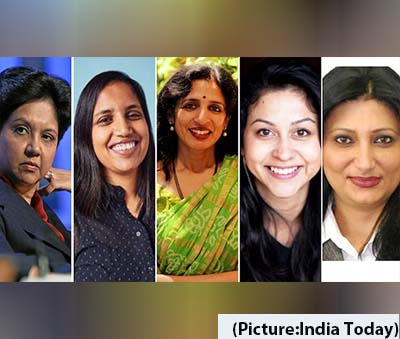 A record 26 are now billionaires, including pop star mogul Rihanna and 23andMe’s Anne Wojcicki. The Indian Americans on the list include Neha Narkhede, co-founder and former chief technology officer of Confluent; PepsiCo’s former chair and CEO Indra Nooyi; Neerja Sethi, co-founder of Syntel; Reshma Shetty, co-founder of Gingko Bioworks; and Jayshree Ullal, president and CEO of Arista Networks.
A record 26 are now billionaires, including pop star mogul Rihanna and 23andMe’s Anne Wojcicki. The Indian Americans on the list include Neha Narkhede, co-founder and former chief technology officer of Confluent; PepsiCo’s former chair and CEO Indra Nooyi; Neerja Sethi, co-founder of Syntel; Reshma Shetty, co-founder of Gingko Bioworks; and Jayshree Ullal, president and CEO of Arista Networks. It all started in November 2019, when she was invited to speak at an event organized by the Harvard Kennedy School. Razdan was later contacted by an apparent organiser of the event, who asked if she would be interested in applying for a teaching position.
It all started in November 2019, when she was invited to speak at an event organized by the Harvard Kennedy School. Razdan was later contacted by an apparent organiser of the event, who asked if she would be interested in applying for a teaching position. In her Chai with Manju interview, Ms. Chandler talks about being addressed with the ‘N word ‘and not being allowed to join local clubs including the country club. She also talks about her being a professional basketball player and important lessons she has learnt as a player and also leadership lessons learnt in her journey to becoming the President & CEO of YWCA Boston, which is also the first YWCA in the United States.
In her Chai with Manju interview, Ms. Chandler talks about being addressed with the ‘N word ‘and not being allowed to join local clubs including the country club. She also talks about her being a professional basketball player and important lessons she has learnt as a player and also leadership lessons learnt in her journey to becoming the President & CEO of YWCA Boston, which is also the first YWCA in the United States. Calling it an opportunity of a lifetime, she said it was a great responsibility to play the late former prime minister. “It is a great responsibility when you portray someone who’s an iconic figure like Mrs. Gandhi. It was very important to get her body language right,” the 46-year-old actress said at the ‘Bell Bottom’ trailer launch.
Calling it an opportunity of a lifetime, she said it was a great responsibility to play the late former prime minister. “It is a great responsibility when you portray someone who’s an iconic figure like Mrs. Gandhi. It was very important to get her body language right,” the 46-year-old actress said at the ‘Bell Bottom’ trailer launch. India went down 4-3 to Great Britain in a closely-fought bronze medal playoff on August 6th despite fighting back from a two-goal deficit. The team led 3-2 at half-time but the British came back strongly in the second half and denied them a historic medal in only their third appearance in the Olympics since women’s hockey made its debut in 1980 at Moscow.
India went down 4-3 to Great Britain in a closely-fought bronze medal playoff on August 6th despite fighting back from a two-goal deficit. The team led 3-2 at half-time but the British came back strongly in the second half and denied them a historic medal in only their third appearance in the Olympics since women’s hockey made its debut in 1980 at Moscow. “I knew I had it in me, but obviously, I’ve had my ups and downs with injuries,” she said Saturday, referring to a persistent ailment in 2018 and 2019. “I’ve been keeping faith all this time. It is amazing.”
“I knew I had it in me, but obviously, I’ve had my ups and downs with injuries,” she said Saturday, referring to a persistent ailment in 2018 and 2019. “I’ve been keeping faith all this time. It is amazing.” Fraser-Pryce, who won the event at the Olympics in Beijing and London, came into the event trying to become the first woman to win three gold medals at this distance. The 34-year-old clocked the fastest time in the heats to qualify for the final, with a time quicker than her gold medal races.
Fraser-Pryce, who won the event at the Olympics in Beijing and London, came into the event trying to become the first woman to win three gold medals at this distance. The 34-year-old clocked the fastest time in the heats to qualify for the final, with a time quicker than her gold medal races. Sindhu, who won India’s historic silver at Rio Olympics in 2016, lost the semi-finals to Chinese Taipei’s Tai Tzu Ying on Saturday but defeated China’s He Bing Jiao the next day to secure the third spot at the podium.
Sindhu, who won India’s historic silver at Rio Olympics in 2016, lost the semi-finals to Chinese Taipei’s Tai Tzu Ying on Saturday but defeated China’s He Bing Jiao the next day to secure the third spot at the podium. Sindhu began earning global recognition for India when she entered the international circuit in 2009 at age 14, winning
Sindhu began earning global recognition for India when she entered the international circuit in 2009 at age 14, winning  Urging women to join the Women Who Win in empowering the next generation of Women Leaders, its co-founder Dr. Manju Sheth states, “We are excited to launch a free Mentorship/ Career Exploration program with six very successful women who have given their gift of time to empower other women. I have always believed that we learn from each other and grow together. My sincere gratitude to our mentors for making this dream a reality for us at Women Who Win platform.”
Urging women to join the Women Who Win in empowering the next generation of Women Leaders, its co-founder Dr. Manju Sheth states, “We are excited to launch a free Mentorship/ Career Exploration program with six very successful women who have given their gift of time to empower other women. I have always believed that we learn from each other and grow together. My sincere gratitude to our mentors for making this dream a reality for us at Women Who Win platform.” “Women’s diets were lacking in diverse foods even before the pandemic, but COVID-19 has further exacerbated the situation,” said Soumya Gupta, a research economist at TCI who coauthored the study along with
“Women’s diets were lacking in diverse foods even before the pandemic, but COVID-19 has further exacerbated the situation,” said Soumya Gupta, a research economist at TCI who coauthored the study along with  Kamala Harris was born to Indian-origin Shyamala Gopalan, a biomedical scientist, and Jamaican-origin Donald J. Harris, an economist and professor emeritus at Stanford University. Kamala and her sister were primarily raised by her mother after the couple parted ways.
Kamala Harris was born to Indian-origin Shyamala Gopalan, a biomedical scientist, and Jamaican-origin Donald J. Harris, an economist and professor emeritus at Stanford University. Kamala and her sister were primarily raised by her mother after the couple parted ways. Dr. Juthani is an infectious diseases physician at Yale School of Medicine in New Haven, where she specializes in the diagnosis, management, and prevention of infections in older adults. Her most recent area of interest is at the interface of infectious diseases and palliative care, including the role of antibiotics at the end of life, the press release from the Governor noted.
Dr. Juthani is an infectious diseases physician at Yale School of Medicine in New Haven, where she specializes in the diagnosis, management, and prevention of infections in older adults. Her most recent area of interest is at the interface of infectious diseases and palliative care, including the role of antibiotics at the end of life, the press release from the Governor noted. Edited by the Delhi-based veteran journalist and foreign policy analystTarunBasu, the evocative collection titled, “Kamala Harris and the Rise of Indian Americans,” captures the rise of the Indians in the US across domains by exceptional achievers like Shashi Tharoor, a former UN public servant-turned Indian politician, and top diplomats like TP Sreenivasan and Arun K Singh. Sixteen eminent journalists, business leaders and scholars have contributed essays to the timely and priceless volume, which charts the community’s growing and influential political engagement. The book was released July 15 by New Delhi-based publisher Wisdom Tree and is available in the U.S. via Amazon. Basu describes the book as an “eclectic amalgam of perspectives on the emerging Indian-American story.”
Edited by the Delhi-based veteran journalist and foreign policy analystTarunBasu, the evocative collection titled, “Kamala Harris and the Rise of Indian Americans,” captures the rise of the Indians in the US across domains by exceptional achievers like Shashi Tharoor, a former UN public servant-turned Indian politician, and top diplomats like TP Sreenivasan and Arun K Singh. Sixteen eminent journalists, business leaders and scholars have contributed essays to the timely and priceless volume, which charts the community’s growing and influential political engagement. The book was released July 15 by New Delhi-based publisher Wisdom Tree and is available in the U.S. via Amazon. Basu describes the book as an “eclectic amalgam of perspectives on the emerging Indian-American story.”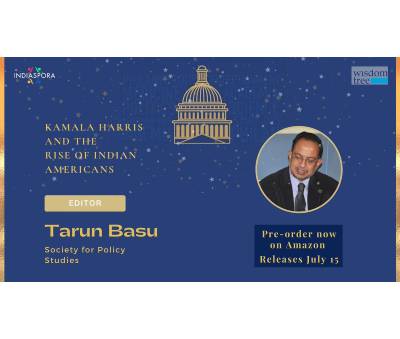 Basu has maintained a keen interest in the accomplishments of Indians abroad and has kept close touch with the community. The purpose of this anthology of essays edited by him is to bring to the global eye the unfolding saga of four million Indians in the United States. Indian Americans currently are just 1% of the US population but are expected to rise to 2% by 2030. Portraying the rise of the Indian American physicians as a strong and influential force in the United States, Ajay Ghosh chronicling their long journey to the United States and their success story, in a Chapter titled, “Physicians of Indian Heritage: America’s Healers” takes the readers to the times of Dr. AnandibaiJoshi, the first documented physician of Indian origin who had landed on the shores of the United States in 1883.
Basu has maintained a keen interest in the accomplishments of Indians abroad and has kept close touch with the community. The purpose of this anthology of essays edited by him is to bring to the global eye the unfolding saga of four million Indians in the United States. Indian Americans currently are just 1% of the US population but are expected to rise to 2% by 2030. Portraying the rise of the Indian American physicians as a strong and influential force in the United States, Ajay Ghosh chronicling their long journey to the United States and their success story, in a Chapter titled, “Physicians of Indian Heritage: America’s Healers” takes the readers to the times of Dr. AnandibaiJoshi, the first documented physician of Indian origin who had landed on the shores of the United States in 1883. “The nomination — and subsequent election — of the U.S.-born Indian origin Kamala Harris put the media spotlight on the small, but respected and high-achieving Indian American community,” writes Basu in his preface. “It is a fascinating and inspiring story of how an immigrant population from a developing country, with low education levels, became the most educated, highest-earning ethnic community in the world’s most advanced nation in almost a single generation,” he said, noting that Indian Americans have made their mark in almost every field, from the traditional trifecta of science, engineering and medicine, to the arts, academia, philanthropy, and, increasingly, politics.
“The nomination — and subsequent election — of the U.S.-born Indian origin Kamala Harris put the media spotlight on the small, but respected and high-achieving Indian American community,” writes Basu in his preface. “It is a fascinating and inspiring story of how an immigrant population from a developing country, with low education levels, became the most educated, highest-earning ethnic community in the world’s most advanced nation in almost a single generation,” he said, noting that Indian Americans have made their mark in almost every field, from the traditional trifecta of science, engineering and medicine, to the arts, academia, philanthropy, and, increasingly, politics.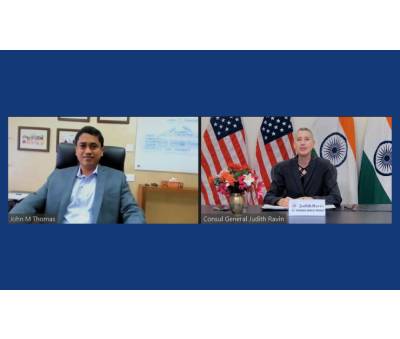 She was welcomed to the city by C.V. Ranvindra, a leading economist and the director of Thiruvananthapuram’s International airport. In his discussion with the Consul General, he explained the Kerala Model of Development, which emphasizes both the traditional and modern sectors like IT, tourism, space technology, and coastal infrastructure. She was also led on a virtual tour of the Government of Kerala’s Technopark by its CEO John M. Thomas. Technopark is the largest IT Park in India. Representatives from 7 major Indian and U.S. IT companies met with the General Consul to discuss Kerala’s current business environment.
She was welcomed to the city by C.V. Ranvindra, a leading economist and the director of Thiruvananthapuram’s International airport. In his discussion with the Consul General, he explained the Kerala Model of Development, which emphasizes both the traditional and modern sectors like IT, tourism, space technology, and coastal infrastructure. She was also led on a virtual tour of the Government of Kerala’s Technopark by its CEO John M. Thomas. Technopark is the largest IT Park in India. Representatives from 7 major Indian and U.S. IT companies met with the General Consul to discuss Kerala’s current business environment. The researchers conducted an online survey of nurses and other non-physician health care workers (HCWs), and received responses from 2,459 participants who provided direct patient care. The survey focused on risk factors for decreased well-being: a key contributor to the epidemic of burnout among health care professionals. The survey also evaluated aspects of resilience. Defined as the ability to cope with and adapt positively to adversity, resilience is an important contributor to well-being. Data were collected in June and July 2020, providing a snapshot of well-being and resilience among HCWs a few months into the pandemic.
The researchers conducted an online survey of nurses and other non-physician health care workers (HCWs), and received responses from 2,459 participants who provided direct patient care. The survey focused on risk factors for decreased well-being: a key contributor to the epidemic of burnout among health care professionals. The survey also evaluated aspects of resilience. Defined as the ability to cope with and adapt positively to adversity, resilience is an important contributor to well-being. Data were collected in June and July 2020, providing a snapshot of well-being and resilience among HCWs a few months into the pandemic.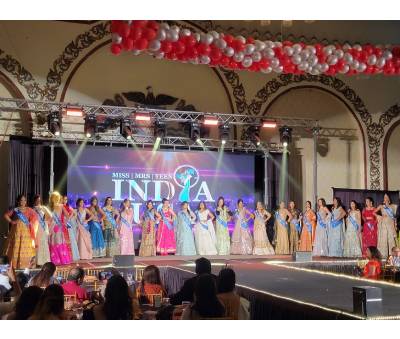 Vaidehi Dongre, 25, a graduate of University of Michigan with International Business as Major, currently employed as Business Development Manager with New Zealand Trade Commission, won the coveted Miss India USA 2021 Pageant on Friday, July 16th at Royal Alberts Palace, Edison, NJ. Organized by the New York based India Festival Committee (IFC) and chaired by Neelam & Dharmatma Saran, this is the longest running Indian pageant outside of India.” I am overwhelmed with the great response this year, said Dharmatma Saran, “with a record number of 61 contestants representing 30 states from across the United States.”
Vaidehi Dongre, 25, a graduate of University of Michigan with International Business as Major, currently employed as Business Development Manager with New Zealand Trade Commission, won the coveted Miss India USA 2021 Pageant on Friday, July 16th at Royal Alberts Palace, Edison, NJ. Organized by the New York based India Festival Committee (IFC) and chaired by Neelam & Dharmatma Saran, this is the longest running Indian pageant outside of India.” I am overwhelmed with the great response this year, said Dharmatma Saran, “with a record number of 61 contestants representing 30 states from across the United States.”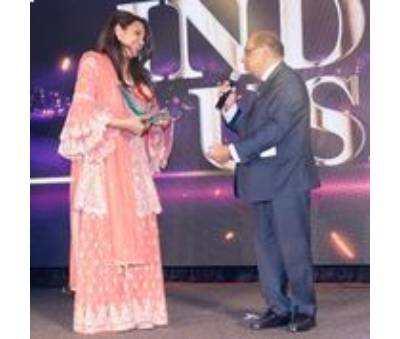 Sonal Dua, 36, from North Carolina won the Mrs Talented Title; Mrs Congeniality was Mohana Namle, 35, from Connecticut. Harshada Patil Fegade, 32 walked away with the Mrs Catwalk Title. Mrs Photogenic was Aparna Chakravarty, 55 from Florida; Mrs Popularity was Swathy Vimalkumar, 32 of Connecticut, and Mrs Chairman Professional was Sheetal Rana, 36 from New York. Amelia Mallareddy from North Carolina was declared Miss Beautiful Face, while Miss Catwalk was Mira Kasari from North Carolina. Rishika Pal of Massachusetts took the
Sonal Dua, 36, from North Carolina won the Mrs Talented Title; Mrs Congeniality was Mohana Namle, 35, from Connecticut. Harshada Patil Fegade, 32 walked away with the Mrs Catwalk Title. Mrs Photogenic was Aparna Chakravarty, 55 from Florida; Mrs Popularity was Swathy Vimalkumar, 32 of Connecticut, and Mrs Chairman Professional was Sheetal Rana, 36 from New York. Amelia Mallareddy from North Carolina was declared Miss Beautiful Face, while Miss Catwalk was Mira Kasari from North Carolina. Rishika Pal of Massachusetts took the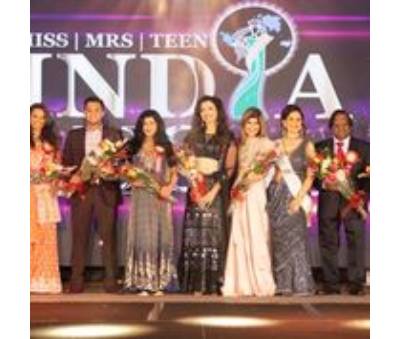 Diana Hayden, a popular Indian actress from Bollywood and Miss World 1997 was the Chief Guest. Shruthi Bekal, Mrs India USA 2019 and Tarna Kaur, Mrs India Worldwide 2019 elegantly emceed the pageant. Kim Kunari, former Miss India USA 2019 and Easha Kode, the first ever Miss Teen India USA were emcees for the pre-pageant event on July 15th. Nishi Bahl was the choreographer assisted by Shilpa Jhurani. This year’s pageant was presented by Yash Pandya and supported by TV Asia and Royal Albert’s Palace. Yash Pandya, Albert Jassani and H R Shah sashed the winners at the pageant.
Diana Hayden, a popular Indian actress from Bollywood and Miss World 1997 was the Chief Guest. Shruthi Bekal, Mrs India USA 2019 and Tarna Kaur, Mrs India Worldwide 2019 elegantly emceed the pageant. Kim Kunari, former Miss India USA 2019 and Easha Kode, the first ever Miss Teen India USA were emcees for the pre-pageant event on July 15th. Nishi Bahl was the choreographer assisted by Shilpa Jhurani. This year’s pageant was presented by Yash Pandya and supported by TV Asia and Royal Albert’s Palace. Yash Pandya, Albert Jassani and H R Shah sashed the winners at the pageant.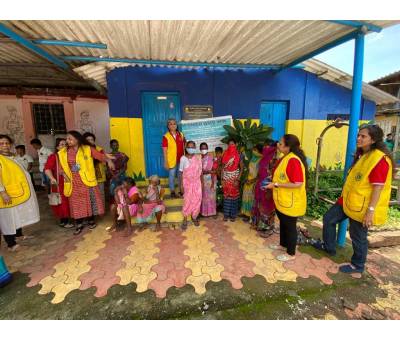 Women Who Win collaborated with the Indian Medical Association of New England to provide the shoes and educational materials on proper foot health. This summer, they had an outstanding response to their pilot program. They partnered with Lions Club of Juhu in Mumbai, to donate over 700 pairs of shoes to the women of the Adivasi village. These women were excited to finally have the right footwear to complete their work, and showed sincere blessings to our entire team. Co-founder Dr. Manju Sheth states, “The donation of shoes project to those who need it the most has been the fulfillment of the dream of our co-founders. As a physician,I have seen up close the devastation caused by multiple medical conditions including diabetes on the feet including ulcers ,gangrene leading to amputations.
Women Who Win collaborated with the Indian Medical Association of New England to provide the shoes and educational materials on proper foot health. This summer, they had an outstanding response to their pilot program. They partnered with Lions Club of Juhu in Mumbai, to donate over 700 pairs of shoes to the women of the Adivasi village. These women were excited to finally have the right footwear to complete their work, and showed sincere blessings to our entire team. Co-founder Dr. Manju Sheth states, “The donation of shoes project to those who need it the most has been the fulfillment of the dream of our co-founders. As a physician,I have seen up close the devastation caused by multiple medical conditions including diabetes on the feet including ulcers ,gangrene leading to amputations.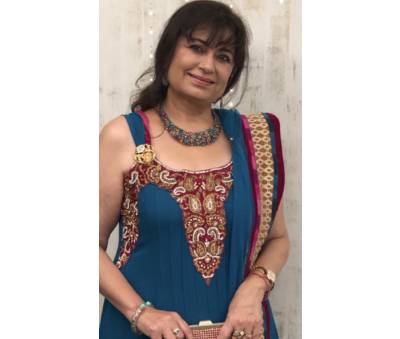 Her advice to those looking for a career in Fashion industry is very timely. She also talks about her fashion icons and styles that she loves including that of our VP Kamala Harris and how much she would love to dress Madonna. Masaba’s bold and beautiful designs which combine traditions with needs of modern women have made her the game changer of the industry. She is the daughter of National award winning actress Neena Gupta and West Indian cricketer, Legendary Vivian Richards.“It was great to have a candid conversation with her. She is so down to earth and fun .She shared her journey of self love and appreciation after a very tough childhood as a biracial child in stereotypical India, adds Dr. Manju.
Her advice to those looking for a career in Fashion industry is very timely. She also talks about her fashion icons and styles that she loves including that of our VP Kamala Harris and how much she would love to dress Madonna. Masaba’s bold and beautiful designs which combine traditions with needs of modern women have made her the game changer of the industry. She is the daughter of National award winning actress Neena Gupta and West Indian cricketer, Legendary Vivian Richards.“It was great to have a candid conversation with her. She is so down to earth and fun .She shared her journey of self love and appreciation after a very tough childhood as a biracial child in stereotypical India, adds Dr. Manju.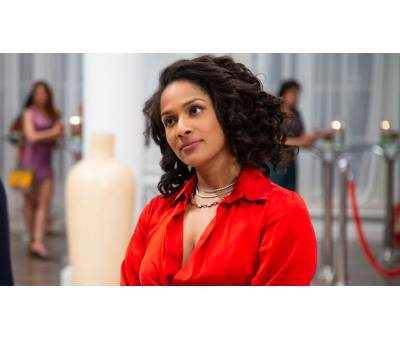 A physician by profession, having a passion for media and commitment to serve the larger humanity, with special focus on women’s empowerment, Dr. Manju Sheth is a Board Certified Internist, currently serving patients at Beth Israel Lahey Hospital.in the Boston Region in Massachusetts. Dr. Sheth is the co-founder and CEO of INE MultiMedia, a non-profit organization devoted to promoting and supporting charitable organizations, art, culture, education and empowerment through workshops, seminars and multimedia. Dr. Sheth is known to be a natural storyteller her popular “Chai with Manju” celebrity series is one of the most read news features in the New England region, where she featured celebrities and spiritual leaders such as Sadhguru, Sri Sri Ravi Shankar, the Kennedys and the like.
A physician by profession, having a passion for media and commitment to serve the larger humanity, with special focus on women’s empowerment, Dr. Manju Sheth is a Board Certified Internist, currently serving patients at Beth Israel Lahey Hospital.in the Boston Region in Massachusetts. Dr. Sheth is the co-founder and CEO of INE MultiMedia, a non-profit organization devoted to promoting and supporting charitable organizations, art, culture, education and empowerment through workshops, seminars and multimedia. Dr. Sheth is known to be a natural storyteller her popular “Chai with Manju” celebrity series is one of the most read news features in the New England region, where she featured celebrities and spiritual leaders such as Sadhguru, Sri Sri Ravi Shankar, the Kennedys and the like. In her inaugural address after she was administered the oath of Office, Dr. Gotimukula reminded the AAPI members about our origin. “We came to the US pursuing the American Dream. Through hard work and a bit of luck, most of us achieved that dream and have become successful and caring doctors who play a crucial role in the American healthcare system. We serve patients. Raise money for local causes. Contribute to our education system and improve the lives of millions of Americans. We joined AAPI to socialize and meet others like us and in that journey learned that through this wonderful organization, we were able to make a bigger impact with the many academic, philanthropic and social initiatives.”
In her inaugural address after she was administered the oath of Office, Dr. Gotimukula reminded the AAPI members about our origin. “We came to the US pursuing the American Dream. Through hard work and a bit of luck, most of us achieved that dream and have become successful and caring doctors who play a crucial role in the American healthcare system. We serve patients. Raise money for local causes. Contribute to our education system and improve the lives of millions of Americans. We joined AAPI to socialize and meet others like us and in that journey learned that through this wonderful organization, we were able to make a bigger impact with the many academic, philanthropic and social initiatives.”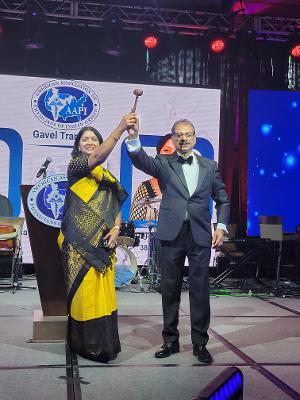 A resident of San Antonio, TX, Dr.Gotimukula is a board certified Pediatric Anesthesiologist, practicing since 2007, is affiliated with Christus Santa Rosa, Baptist and Methodist Healthcare systems in San Antonio. After graduating with distinction from Kakatiya Medical College, NTR University of Health Sciences in India, she did Residency at University of Miami & University of Illinois, and Fellowship in Pediatric Anesthesiology at University of Michigan.
A resident of San Antonio, TX, Dr.Gotimukula is a board certified Pediatric Anesthesiologist, practicing since 2007, is affiliated with Christus Santa Rosa, Baptist and Methodist Healthcare systems in San Antonio. After graduating with distinction from Kakatiya Medical College, NTR University of Health Sciences in India, she did Residency at University of Miami & University of Illinois, and Fellowship in Pediatric Anesthesiology at University of Michigan.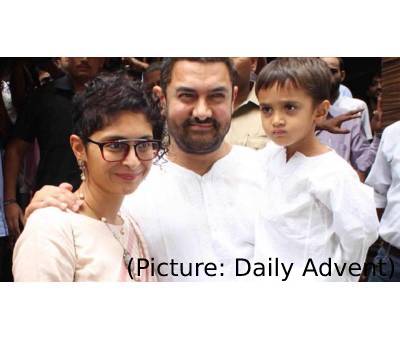 “In these 15 beautiful years together we have shared a lifetime of experiences, joy and laughter,” the statement said. Khan, 56, and Rao, 47, first met in 2001, and married four years later. They said they wanted to “begin a new chapter in our lives – no longer as husband and wife, but as co-parents and family for each other”. They added that their relationship had “only grown in trust, respect and love”. They met on sets of the AshutoshGowariker-directed Lagaan (2001), one of the most commercially successful Indian movies, where the former was an assistant director. Their romance, Khan said in some interviews, bloomed later when the actor was going through the process of legal separation from his first wife, Reena Dutta. Khan and Dutta, who have a son, Junaid, and a daughter, Ira, together, divorced in 2002.
“In these 15 beautiful years together we have shared a lifetime of experiences, joy and laughter,” the statement said. Khan, 56, and Rao, 47, first met in 2001, and married four years later. They said they wanted to “begin a new chapter in our lives – no longer as husband and wife, but as co-parents and family for each other”. They added that their relationship had “only grown in trust, respect and love”. They met on sets of the AshutoshGowariker-directed Lagaan (2001), one of the most commercially successful Indian movies, where the former was an assistant director. Their romance, Khan said in some interviews, bloomed later when the actor was going through the process of legal separation from his first wife, Reena Dutta. Khan and Dutta, who have a son, Junaid, and a daughter, Ira, together, divorced in 2002. Kiran Rao and Aamir Khan’s plain-spoken statement assures that they will continue collaborating on work and pet projects. “We began a planned separation some time ago, and now feel comfortable to formalise this arrangement, of living separately yet sharing our lives the way an extended family does. We remain devoted parents to our son Azad, who we will nurture and raise together. We will also continue to work as collaborators on films, Paani Foundation, and other projects that we feel passionate about,” they said. Announcing Azad’s birth in 2011, the former couple had shown similar forthrightness when they mentioned that he was born after “a long wait” and “through IVF-surrogacy”. They ended their statement saying: “A big thank you to our families and friends for their constant support and understanding about this evolution in our relationship, and without whom we would not have been so secure in taking this leap. We request our well wishers for good wishes and blessings, and hope that — like us — you will see this divorce not as an end, but as the start of a new journey.”
Kiran Rao and Aamir Khan’s plain-spoken statement assures that they will continue collaborating on work and pet projects. “We began a planned separation some time ago, and now feel comfortable to formalise this arrangement, of living separately yet sharing our lives the way an extended family does. We remain devoted parents to our son Azad, who we will nurture and raise together. We will also continue to work as collaborators on films, Paani Foundation, and other projects that we feel passionate about,” they said. Announcing Azad’s birth in 2011, the former couple had shown similar forthrightness when they mentioned that he was born after “a long wait” and “through IVF-surrogacy”. They ended their statement saying: “A big thank you to our families and friends for their constant support and understanding about this evolution in our relationship, and without whom we would not have been so secure in taking this leap. We request our well wishers for good wishes and blessings, and hope that — like us — you will see this divorce not as an end, but as the start of a new journey.” Kathy’s engagement did not stop when the genocide did. This August 22, Kathy is co-hosting with the Religious Freedom & Business Foundation a
Kathy’s engagement did not stop when the genocide did. This August 22, Kathy is co-hosting with the Religious Freedom & Business Foundation a 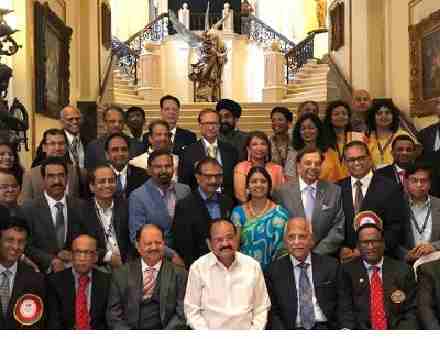
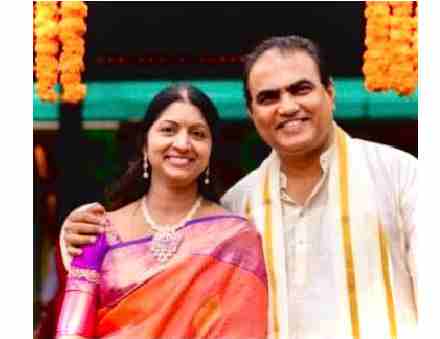 After graduating with distinction from Kakatiya Medical College, NTR University of Health Sciences in India, she did Residency at University of Miami & University of Illinois, and Fellowship in Pediatric Anesthesiology at University of Michigan.Narrating her childhood ambitions “my parents always encouraged and nurtured me the skills to be a leader and this positive culture influenced me throughout my childhood,” recalls Dr. Gotimukula, who grew up in a family of engineers at Regional Engineering College Campus all her childhood. Her ambition in childhood was “to become a doctor, both to make her parents happy, and to do good for the community. Joining medical school and later on, practicing Medicine was a dream come true and says “I am thankful to my parents and my family who motivated me and mentored me to achieve my goals.”
After graduating with distinction from Kakatiya Medical College, NTR University of Health Sciences in India, she did Residency at University of Miami & University of Illinois, and Fellowship in Pediatric Anesthesiology at University of Michigan.Narrating her childhood ambitions “my parents always encouraged and nurtured me the skills to be a leader and this positive culture influenced me throughout my childhood,” recalls Dr. Gotimukula, who grew up in a family of engineers at Regional Engineering College Campus all her childhood. Her ambition in childhood was “to become a doctor, both to make her parents happy, and to do good for the community. Joining medical school and later on, practicing Medicine was a dream come true and says “I am thankful to my parents and my family who motivated me and mentored me to achieve my goals.”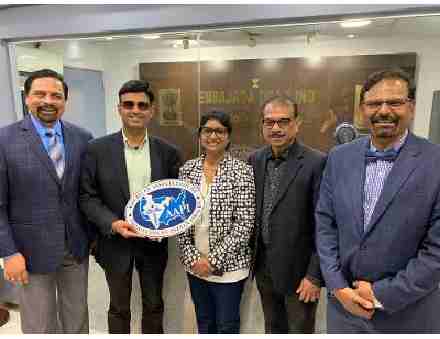 As the President of AAPI, Dr. Gotimukula will work towards “strengthening the organization’s mission, encourage participation of more young physicians, develop the best communications platforms for Indian American Physicians and keep the members well connected. “Patience, Perseverance, Passion and Positive Attitude,” are her mantra to be successful in leadership. She realizes that leadership is a skill and these attributes within her have been well recognized by the physician community locally and nationally.
As the President of AAPI, Dr. Gotimukula will work towards “strengthening the organization’s mission, encourage participation of more young physicians, develop the best communications platforms for Indian American Physicians and keep the members well connected. “Patience, Perseverance, Passion and Positive Attitude,” are her mantra to be successful in leadership. She realizes that leadership is a skill and these attributes within her have been well recognized by the physician community locally and nationally.
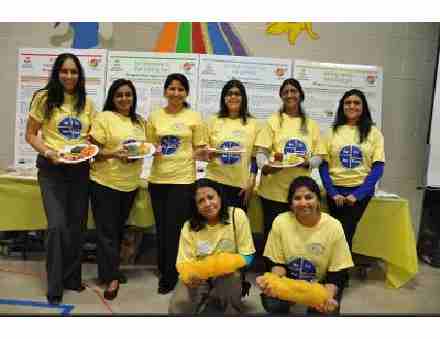 As a woman leader and as the elected leader of a diverse organization such as AAPI, Dr. Gotimukula is aware of the many challenges she is likely to encounter as AAPI’s President. “As leader of the largest physician ethnic nonprofit organization with diverse cultures, yes, challenges are expected.” “On a personal note, time management, balancing career and family responsibilities,” will be challenging. Dr. Gotimukula plans to address them with proper communication, nurture team and engage BK members in problem solving. Being an anesthesiologist, profession has taught me the skills of multi-tasking and staying focused! Daily Meditation and physical exercise keep me energetic and productive until the last minute of my day. Being a woman, I have leaned into being compassionate, empathetic, persevering, patient, and resilient.
As a woman leader and as the elected leader of a diverse organization such as AAPI, Dr. Gotimukula is aware of the many challenges she is likely to encounter as AAPI’s President. “As leader of the largest physician ethnic nonprofit organization with diverse cultures, yes, challenges are expected.” “On a personal note, time management, balancing career and family responsibilities,” will be challenging. Dr. Gotimukula plans to address them with proper communication, nurture team and engage BK members in problem solving. Being an anesthesiologist, profession has taught me the skills of multi-tasking and staying focused! Daily Meditation and physical exercise keep me energetic and productive until the last minute of my day. Being a woman, I have leaned into being compassionate, empathetic, persevering, patient, and resilient.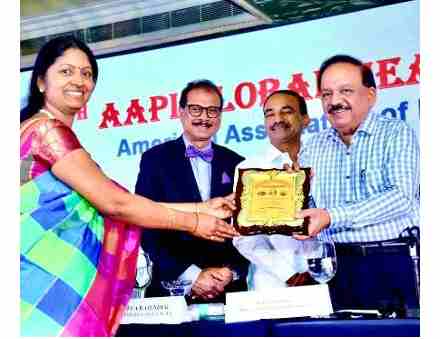
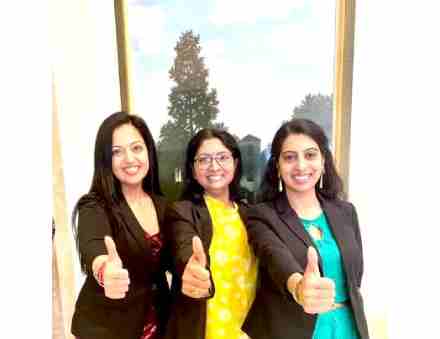
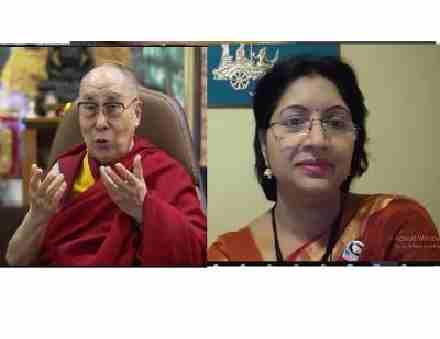 Her biggest achievement in life so far is “Being what I am today, a physician, a leader, and a humble human being and be able to give back to my society,” says Dr. Gotimukula. Among the goals for AAPI, the visionary woman leader says, “With the collaboration, cooperation and support of the Executive Committee, and the entire AAPI family, I want to build a strong support system to protect the IMG physicians and their issues and help with physician burnout. I will further the existing educational goals and charitable goals and engage member physicians to support these goals.” While dedicating her talents, skills, and experiences for the AAPI family, which she has come to call as her own, Dr. Gotimukula says, “I am looking forward to get the best wishes & blessings from our members in my pursuit to lead this prestigious organization and do the best to our physician community.”
Her biggest achievement in life so far is “Being what I am today, a physician, a leader, and a humble human being and be able to give back to my society,” says Dr. Gotimukula. Among the goals for AAPI, the visionary woman leader says, “With the collaboration, cooperation and support of the Executive Committee, and the entire AAPI family, I want to build a strong support system to protect the IMG physicians and their issues and help with physician burnout. I will further the existing educational goals and charitable goals and engage member physicians to support these goals.” While dedicating her talents, skills, and experiences for the AAPI family, which she has come to call as her own, Dr. Gotimukula says, “I am looking forward to get the best wishes & blessings from our members in my pursuit to lead this prestigious organization and do the best to our physician community.” “It was like our worst fears being confirmed,” says
“It was like our worst fears being confirmed,” says  Mindy Kaling, George Clooney, Don Cheadle, Eva Longoria and Kerry Washington are among several Hollywood personalities who will come together to co-found a film school for underserved communities next year. The institution, named Roybal School of Film and Television Production, will provide academic as well as practical lessons, and access to Hollywood stalwarts and professionals, besides an internship initiative, according to variety.com.
Mindy Kaling, George Clooney, Don Cheadle, Eva Longoria and Kerry Washington are among several Hollywood personalities who will come together to co-found a film school for underserved communities next year. The institution, named Roybal School of Film and Television Production, will provide academic as well as practical lessons, and access to Hollywood stalwarts and professionals, besides an internship initiative, according to variety.com. Gender difference is intimately stitched into the fabric of humanness. At
Gender difference is intimately stitched into the fabric of humanness. At 
 The congregation, however, followed church laws to give her an opportunity to appeal to the Vatican and continue in the convent. The nun appealed against the congregation’s dismissal order before the Vatican’s Congregation for Oriental Churches, which rejected her appeal on Oct. 11, 2019.But she refused to move out of the convent and within a fortnight appealed to the Supreme Tribunal, the Vatican’s highest appeal court, against her dismissal. The appeal now stands rejected and the Vatican has confirmed her dismissal, said Sister Ann Joseph, the congregation’s superior general, in a June 12 letter.
The congregation, however, followed church laws to give her an opportunity to appeal to the Vatican and continue in the convent. The nun appealed against the congregation’s dismissal order before the Vatican’s Congregation for Oriental Churches, which rejected her appeal on Oct. 11, 2019.But she refused to move out of the convent and within a fortnight appealed to the Supreme Tribunal, the Vatican’s highest appeal court, against her dismissal. The appeal now stands rejected and the Vatican has confirmed her dismissal, said Sister Ann Joseph, the congregation’s superior general, in a June 12 letter. Speaking on her first overseas trip since taking office, she said the journey north was dangerous and would mainly benefit people smugglers. Her comments, during a press conference after she met privately with Giammattei, underscored the challenge that remains even as Harris engages in substantive talks with the Guatemalan and Mexican presidents during a three-day visit to the region this week, her first foreign trip as vice president.“I want to emphasize that the goal of our work is to help Guatemalans find hope at home,” Harris said. “At the same time, I want to be clear to folks in this region who are thinking about making that dangerous trek to the United States-Mexico border: Do not come, do not come.”
Speaking on her first overseas trip since taking office, she said the journey north was dangerous and would mainly benefit people smugglers. Her comments, during a press conference after she met privately with Giammattei, underscored the challenge that remains even as Harris engages in substantive talks with the Guatemalan and Mexican presidents during a three-day visit to the region this week, her first foreign trip as vice president.“I want to emphasize that the goal of our work is to help Guatemalans find hope at home,” Harris said. “At the same time, I want to be clear to folks in this region who are thinking about making that dangerous trek to the United States-Mexico border: Do not come, do not come.” “I just feel a kind of relieved and happy because I am not looking for breaking record. I just [wanted to] challenge myself,” Ms Tsang told media in Nepal’s capital Kathmandu on Sunday, after safely returning from Everest.Last Sunday, Arthur Muir, 75, became the oldest American to climb the mountain, while 46-year old Zhang Hong of China became the first blind man from Asia to complete the feat on Monday.
“I just feel a kind of relieved and happy because I am not looking for breaking record. I just [wanted to] challenge myself,” Ms Tsang told media in Nepal’s capital Kathmandu on Sunday, after safely returning from Everest.Last Sunday, Arthur Muir, 75, became the oldest American to climb the mountain, while 46-year old Zhang Hong of China became the first blind man from Asia to complete the feat on Monday. Her life has been made into a powerful movie called ‘Sky is Pink’ with Priyanka Chopra Jonas , Farhan Akhtar and ZairaWasim playing lead roles. The movie is now streaming on Netflix. It was inspiring to share Niren’s journey on Chai with Manju. His input in the food and hospitality industry were very insightful including leading Panera profitably in tough Covid times. His advice to those looking to invest in India is worth a watch. His emotional appeal to donate bone marrow to save lives is important as Indian lag behind and his daughter’s life would have been saved with a timely bone marrow donation I loved his three step recipe to make dreams come true and to live life fully describing life as an unfinished painting.
Her life has been made into a powerful movie called ‘Sky is Pink’ with Priyanka Chopra Jonas , Farhan Akhtar and ZairaWasim playing lead roles. The movie is now streaming on Netflix. It was inspiring to share Niren’s journey on Chai with Manju. His input in the food and hospitality industry were very insightful including leading Panera profitably in tough Covid times. His advice to those looking to invest in India is worth a watch. His emotional appeal to donate bone marrow to save lives is important as Indian lag behind and his daughter’s life would have been saved with a timely bone marrow donation I loved his three step recipe to make dreams come true and to live life fully describing life as an unfinished painting.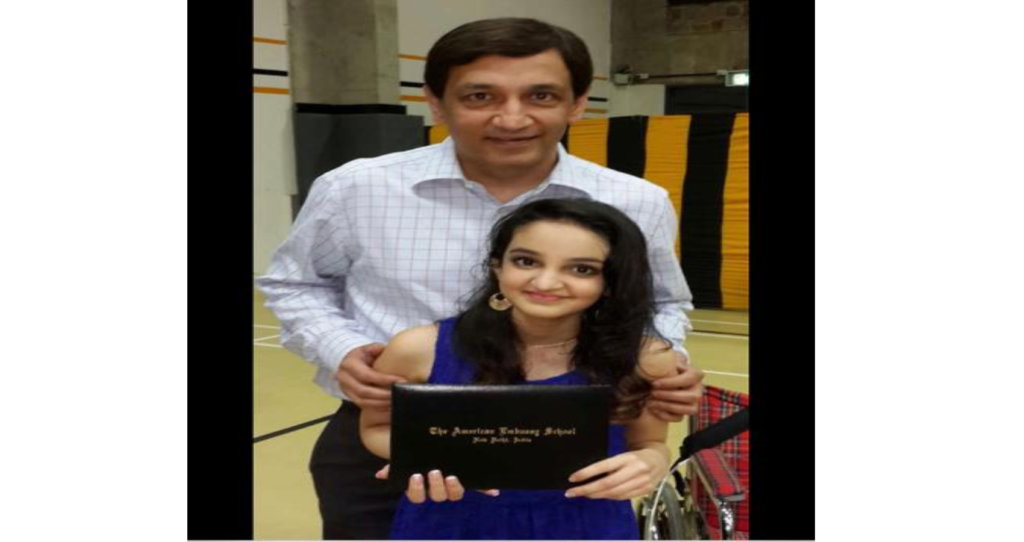 He holds a bachelor’s degree in Economics from St. Stephen’s College in Delhi, an MBA in marketing from the University of Delhi, and also completed the Advanced Management Program at Harvard Business School.One of the best parts of the interview with Dr. Manju Shethwas to watch him sing. Music plays a huge role in his life. Indeed, he is a rockstar CEO.
He holds a bachelor’s degree in Economics from St. Stephen’s College in Delhi, an MBA in marketing from the University of Delhi, and also completed the Advanced Management Program at Harvard Business School.One of the best parts of the interview with Dr. Manju Shethwas to watch him sing. Music plays a huge role in his life. Indeed, he is a rockstar CEO.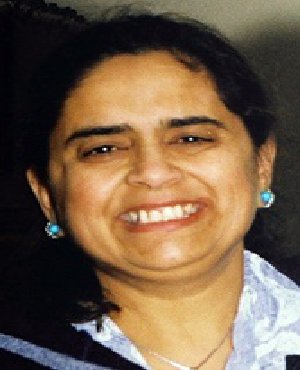 My childhood was mostly normal with one main exception: Since both my parents did theater, I spent a lot of evenings alone at home with domestic help or at the rehearsals with one of them. The weekends again would be spent backstage or dozing in the auditorium. Living in an apartment complex eventually introduced me to lots of friends, whose houses became another good option for weekends. When they toured for plays, I spent a lot of time with my maternal grandparents. While I didn’t see my parents often, being surrounded by people 24/7 definitely gave me a supportive environment to grow up in. Although I grew up in a vibrant theater background, the theater bug did not really bite till much later in life after I met my Husband Chandu Shah, who is also from a similar background.
My childhood was mostly normal with one main exception: Since both my parents did theater, I spent a lot of evenings alone at home with domestic help or at the rehearsals with one of them. The weekends again would be spent backstage or dozing in the auditorium. Living in an apartment complex eventually introduced me to lots of friends, whose houses became another good option for weekends. When they toured for plays, I spent a lot of time with my maternal grandparents. While I didn’t see my parents often, being surrounded by people 24/7 definitely gave me a supportive environment to grow up in. Although I grew up in a vibrant theater background, the theater bug did not really bite till much later in life after I met my Husband Chandu Shah, who is also from a similar background.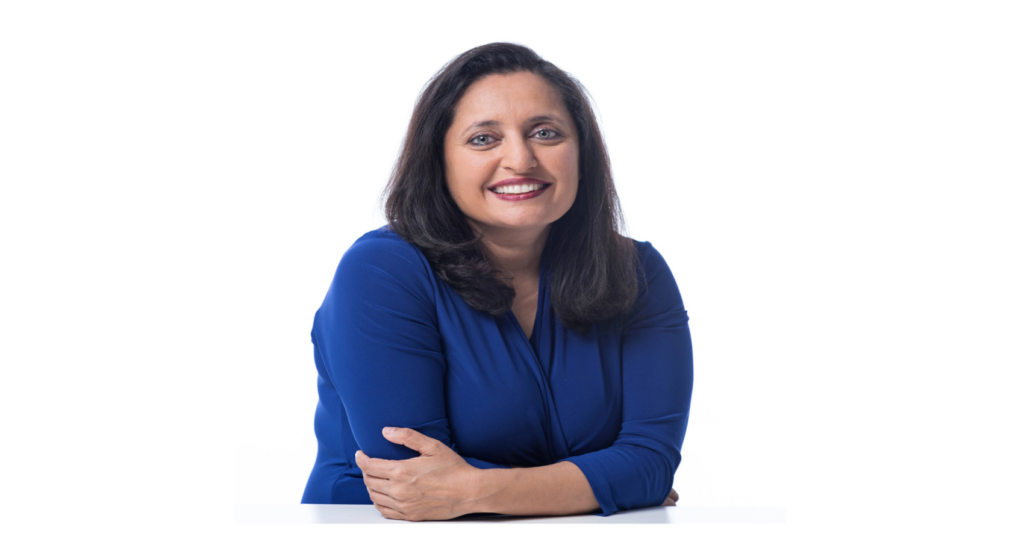 Sonal Shah, the foundation’s president, and TAAF board members were at the White House, where they briefed administration officials, including domestic policy adviser Susan Rice. They discussed how the foundation plans to spend the $1.1 billion in donations to fight back against hate crimes directed at these communities, according to a statement from the foundation. Biden and Vice President Kamala Harris dropped by the meeting to express their support, the foundation said.
Sonal Shah, the foundation’s president, and TAAF board members were at the White House, where they briefed administration officials, including domestic policy adviser Susan Rice. They discussed how the foundation plans to spend the $1.1 billion in donations to fight back against hate crimes directed at these communities, according to a statement from the foundation. Biden and Vice President Kamala Harris dropped by the meeting to express their support, the foundation said. Actress-politician Urmila Matondkar described Madhuri as “graceful” and “gorgeous” while wishing her.“Wishing a very Happy Birthday to the most gracious, graceful n gorgeous @MadhuriDixitji..lots of love n best wishes always,” wrote Urmila.Actress RaveenaTandon wrote: “Happy Birthday Beautiful! @MadhuriDixitloadsa love and happiness!”Actor Abhishek Bachchan tweeted: “@MadhuriDixit wishing you a very happy, healthy and safe birthday. Lots of love and respect.”
Actress-politician Urmila Matondkar described Madhuri as “graceful” and “gorgeous” while wishing her.“Wishing a very Happy Birthday to the most gracious, graceful n gorgeous @MadhuriDixitji..lots of love n best wishes always,” wrote Urmila.Actress RaveenaTandon wrote: “Happy Birthday Beautiful! @MadhuriDixitloadsa love and happiness!”Actor Abhishek Bachchan tweeted: “@MadhuriDixit wishing you a very happy, healthy and safe birthday. Lots of love and respect.”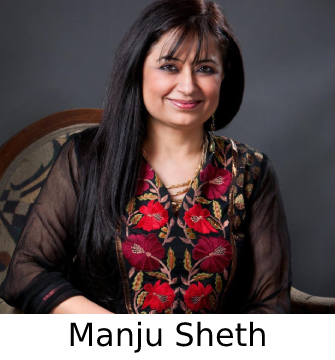 Ms. Banerjee is an award-winning and bestselling author, poet, activist and teacher of writing. Her work has been published in over 50 magazines, including the
Ms. Banerjee is an award-winning and bestselling author, poet, activist and teacher of writing. Her work has been published in over 50 magazines, including the 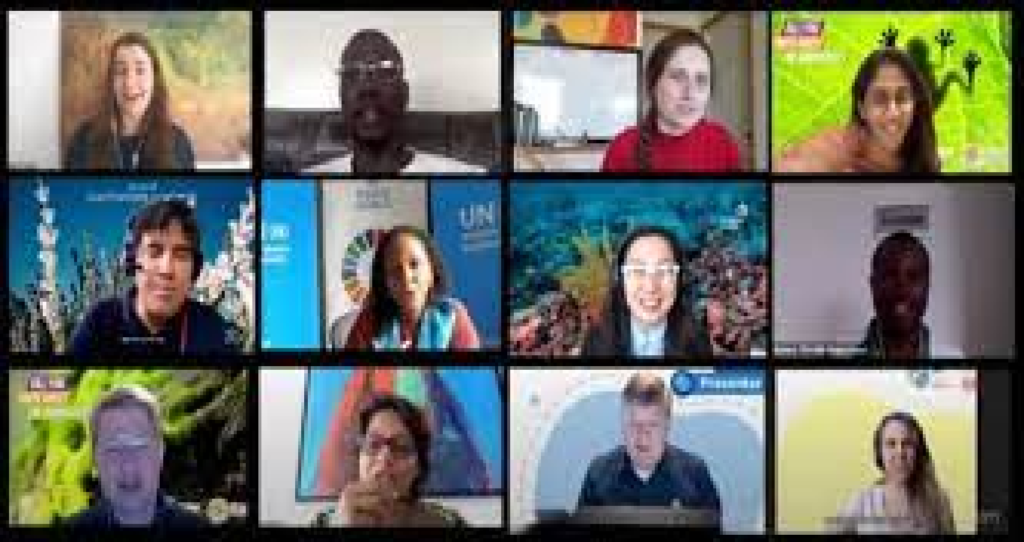 The United Nations Secretary-General’s Envoy on Youth, Jayathma Wickramanayake, told IPS that the Summit achieved an important goal of bringing institutions and political conversations closer to young people. During her tenure, Wickramanayake has advocated for a common set of principles for youth engagement within the UN system, based on rights, safety and adequate financing. She said it is important for institutions to open their doors to meaningful engagement with young people.
The United Nations Secretary-General’s Envoy on Youth, Jayathma Wickramanayake, told IPS that the Summit achieved an important goal of bringing institutions and political conversations closer to young people. During her tenure, Wickramanayake has advocated for a common set of principles for youth engagement within the UN system, based on rights, safety and adequate financing. She said it is important for institutions to open their doors to meaningful engagement with young people.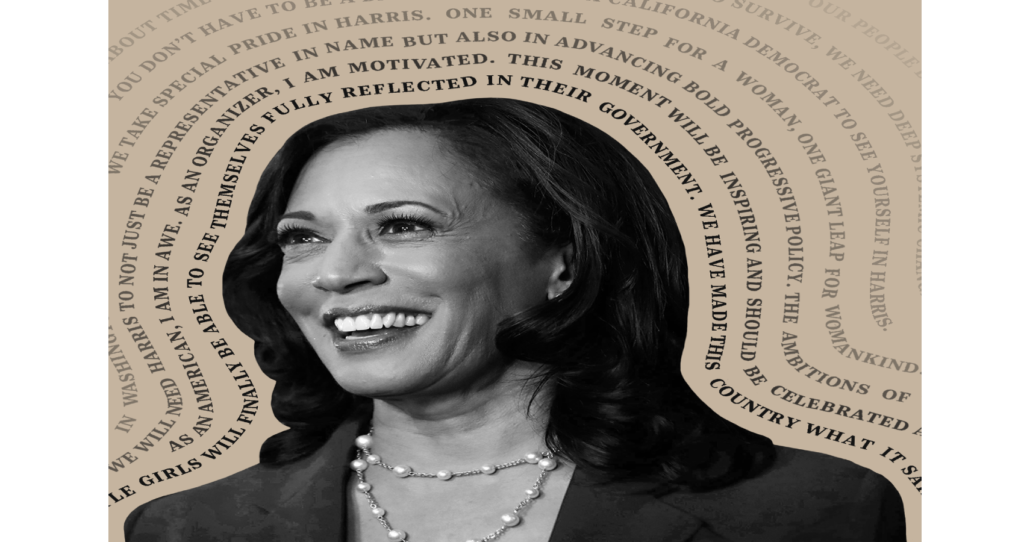 Harris has become increasingly involved in promoting the Biden administration’s infrastructure proposal currently being considered by Congress, known as the American Jobs Plan. She’s taken part in meetings with the Congressional Black Caucus as well as
Harris has become increasingly involved in promoting the Biden administration’s infrastructure proposal currently being considered by Congress, known as the American Jobs Plan. She’s taken part in meetings with the Congressional Black Caucus as well as  In Waffles + Mochi, the puppets learn how to make mazamorra morada, a sweet purple corn desert, in Lamay, Peru. Each episode is focused around a specific ingredient. In the sixth episode, the puppets are sent on a mission to collect different types of eggs to bring to chef
In Waffles + Mochi, the puppets learn how to make mazamorra morada, a sweet purple corn desert, in Lamay, Peru. Each episode is focused around a specific ingredient. In the sixth episode, the puppets are sent on a mission to collect different types of eggs to bring to chef 